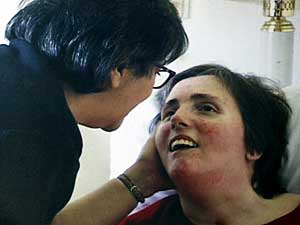|
Audio
Photos
More from MPR
Resources
|
June 16, 2005
Terri Schiavo's parents and siblings responded Thursday to the release of her much-anticipated autopsy report. Her family members are special guests at the National Right to Life Committee convention taking place this week in Bloomington. They aren't challenging the report which shows that Terri Schiavo's brain damage was severe and irreversible, but they do have a different interpretation of the findings.
Bloomington, Minn. — The autopsy report was released Wednesday by a Florida medical examiner. It found that Terri Schiavo's brain was half the size of a normal brain for a woman her age. It concluded that no amount of therapy or treatment would have regenerated her lost neurons. The report was based on more than 200 internal and external images of Schiavo.
Terri Schiavo's sister, Suzanne Vitadamo, says all the autopsy does is confirm that her sister had a disability.
"We all knew Terri was seriously brain injured before the IME report. This is nothing new," said Vitadamo.
The autopsy also determined that Terri Schiavo was blind, undermining her family's contention that Terri was an active participant in visits.
Vitadamo says the autopsy only proves that Schiavo was blind at death. She believes her sister's blindness could have been brought on by severe dehydration, caused when her feeding tube was removed.
The autopsy did reveal that Schiavo could have lived at least another 10 years with proper care. Vitadamo says like any disabled person, Terri should have been given the opportunity to live. But she says her case was always misrepresented.
"Tragically, that is what happened to Terri. As a society it seems that we have lost our compassion for the disabled," she said.
Vitadamo made her comments on the first day of the National Right to Life Committee's annual convention in Bloomington. The organization was heavily involved in pressing the president and Congress to intervene in the Schiavo case.
NRLC President Wanda Franz says even though her group lost its battle to save Terri Schiavo's life, it won't give up the fight.
"I think it's very important for us to make sure that people understand what the situation was, and not be misrepresented as an end-of-life situation, or as a situation where she was dying and it was just allowing something natural to happen," says Franz. "We'll certainly be trying to clarify these issues too, and using the case as an example of the kind of problem that we're having in this country today -- where disabled people really are losing their right to life because stronger people are in a position to take that life away from them."
As a result of the Schiavo case, the NRLC has turned its attention to promoting advanced directives. They're basically instruction forms for doctors on end-of-life care for individual patients.
Burke Balch heads the Robert Powell Center for Medical Ethics, an arm of the NRLC. He says the organization's Web site has been flooded with requests for its version of an advanced directive, called "The Will to Live."
"One of the most critically important things is that people do need to fill out advance directives such as the "Will to Live" ... that says clearly, 'If I were in a certain degree of disability, I wouldn't want to be starved or dehydrated to death.'"
As much as the Shiavo case has rallied pro-life groups in this country, it's also galvanized many others, including pro-choice organizations.
Nancy Keenan, president of NARAL Pro-Choice America, says the fact is that most Americans did not approve of how the Schiavo case was handled. She says in particular many people were offended by the extraordinary government involvement to save Schiavo's life.
"Politicians should stay out of personal family decisions, whether it is on the issue that was faced by the Schiavo family, or whether it was the issue faced by women every day of their lives when they're deciding to terminate a pregnancy. And so I think Americans pushed back real hard," says Keenan.
A tribute to Terri Schiavo will take place Saturday at the National Right to Life Committee Convention. Her family has renewed a plea to Michael Schiavo for information on the location of Terri Schiavo's ashes. They say their Christian faith demands a proper burial.






